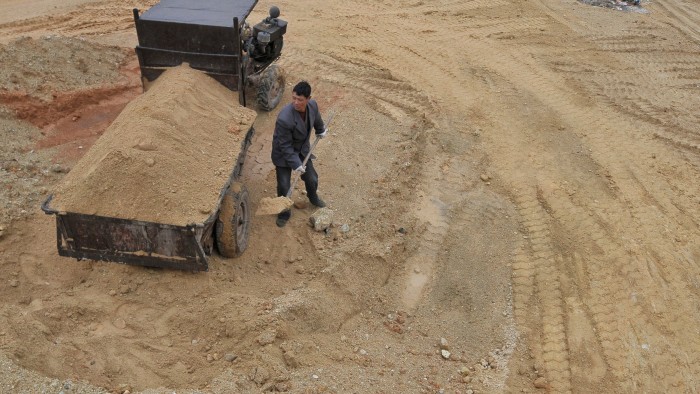Unlock the Editor’s Digest for free
Roula Khalaf, Editor of the FT, selects her favourite stories in this weekly newsletter.
China’s success in snarling global supply chains by stemming the flow of rare earths has piled pressure on Washington and made clear Beijing’s power to weaponise export controls on a wider range of critical goods, analysts and businesspeople say.
China dominates the supply chain for key minerals and its commerce ministry started requiring licences for exports of rare earths and related magnets in early April. The slow approval process has rocked global supply chains and given Beijing leverage over the US after Donald Trump’s sweeping “liberation day” tariffs.
There are now hopes more licences will be issued after Trump and China’s President Xi Jinping spoke on Thursday, paving the way for a new round of trade talks in London on Monday. On Saturday Beijing signalled a faster approvals process for some European companies.
However, Xi’s recent deployment of export controls has shifted the balance of power in US-China trade talks back to Beijing, experts said.
Andrew Gilholm, head of China analysis at consultancy Control Risks, said export controls have helped Xi’s administration push back against not only the US, but third countries under pressure from Washington to take a harder line on China.
“The simple truth is we don’t have a lot of precedent for this. The export controls are a dream tool for Beijing; they can tweak, tighten, loosen, make it apply to all countries or to one country,” Gilholm said.
China’s foreign ministry on Saturday confirmed vice-premier He Lifeng will travel to the UK for talks this week. Trump has dispatched Treasury secretary Scott Bessent, commerce secretary Howard Lutnick and US trade representative Jamieson Greer for the first round of negotiations since the 90-day trade truce was struck on May 12.
The danger for the US and the EU — both are locked in trade wars with China — is that the leverage that Beijing has discovered with rare earth export controls can also be replicated in other areas of the high-tech supply chain, analysts said.
If Beijing wanted to respond to future escalations, such as further tightening of chip controls by the US, it could restrict flows of materials such as titanium, magnesium, and light rare earths so far excluded from the new licence system, according an analysis from Trivium, a Beijing consultancy,
China also dominates production of new ultra-powerful magnets, more powerful transistors, denser and cheaper batteries and new chips and software, Gavekal head of research Arthur Kroeber said in a note to clients. He also cited “a formidable ecosystem of overlapping industries” across electric and autonomous vehicles, drones, robots, sensors, smartphones, “and the semiconductors, batteries and AI that power them”.
“The balance of leverage is shifting fast in China’s favour, a fact that the Trump team has only barely begun to recognise,” he added.
According to a flash survey by the American Chamber of Commerce in China, a lobby group, in late May more than three quarters of companies affected by the rare earth controls only had three months of stockpiles, highlighting how close many factories were to shutting down.
The European Chamber said in recent days there has been an increase in the number of export approvals, deemed most urgent, “to avoid a major crisis”. But the bloc’s companies were struggling with the licence process, both in terms of delays and a lack of transparency.
It is unclear whether Beijing intended to target Europe but once the shortages became clear, it could have cleared the backlog, said one businessperson.
The slow approval of export licences has already led to a series of urgent bilateral negotiations in Beijing, giving China greater leverage on other areas of contention. Over recent weeks rare earths have been raised directly in Beijing by South Korea, Japan and some EU member states, according to people familiar with the matter.
China’s approach is “purely transactional”, said one western diplomat familiar with the negotiations, adding: “they want to divide and conquer”.
Beijing has argued its use of export controls is in line with international practice for products that can be used in both military and civilian applications. The US has also imposed restrictions on the sales of semiconductors and chipmaking equipment to China, curbs which are aimed at slowing the country’s technological rise.
The commerce ministry did not immediately respond to questions on Saturday.
The threat of being cut off from Chinese-made rare earths and magnets is strengthening resolve to reduce dependence on China’s industrial supply chain.
Ilaria Mazzocco, an expert on industrial policy with the Center for Strategic and International Studies, a Washington think-tank, expects governments to also start to build bigger resource stockpiles to withstand such shocks and for more funding to become available to develop alternatives.
Tom Nunlist, Shanghai-based associate director at Trivium, said current export controls have proved “extremely effective” and could last, given countries cannot simply “open mines and set up refinement operations overnight”.
“China needs first to figure out how to more precisely wield the considerable firepower it already has.”
